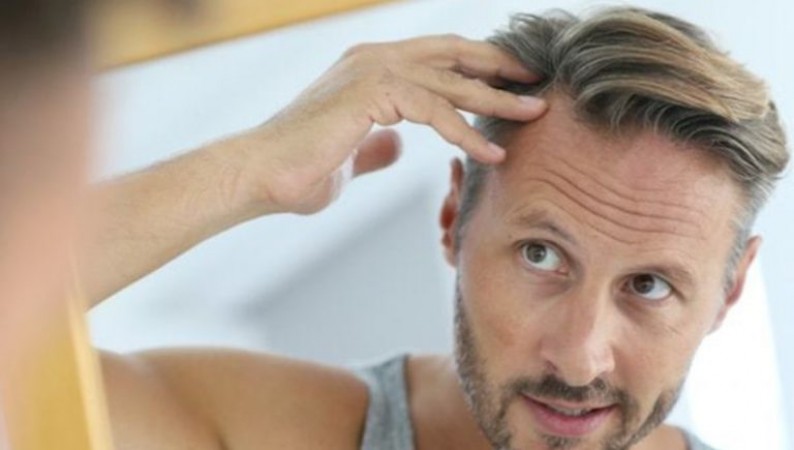
Hair loss can be distressing and impact our self-esteem. While there can be various reasons for hair loss, including genetics, stress, and medical conditions, our diet plays a significant role in promoting healthy hair growth and minimizing hair loss. In this article, we will delve into the essential nutrients and foods that can aid in combating hair loss and promoting luscious locks naturally.
Hair loss can be a disheartening experience, but with the right approach, you can support your hair health and possibly prevent further loss. While there's no magical cure, making conscious choices about what you eat can significantly impact the vitality of your hair.
Understanding Hair Loss
Before we dive into dietary solutions, it's important to understand the various factors that contribute to hair loss. Genetics, hormonal imbalances, stress, and certain medical conditions can all play a role. However, diet and nutrition also have a profound impact on the health of your hair.
The Role of Nutrition in Hair Health
Your hair follicles require a range of nutrients to function optimally and produce strong, healthy hair. A deficiency in essential vitamins and minerals can lead to hair thinning and loss. By focusing on a balanced diet rich in hair-friendly nutrients, you can potentially slow down hair loss and promote regrowth.
Key Nutrients for Hair Growth
Biotin: The Hair Vitamin
Biotin, also known as vitamin H, is a B-vitamin that plays a crucial role in promoting healthy hair growth. It aids in the production of keratin, a protein that forms the structure of your hair.
Omega-3 Fatty Acids for Scalp Health
Omega-3 fatty acids are renowned for their anti-inflammatory properties and their ability to promote a healthy scalp. A well-nourished scalp provides the foundation for strong hair growth.
Vitamins C and E: Antioxidant Powerhouses
Vitamins C and E are antioxidants that help protect hair follicles from damage caused by free radicals. They also support the absorption of iron, another essential nutrient for hair health.
Zinc: Strengthening Hair Structure
Zinc plays a crucial role in repairing and maintaining the tissues that make up your hair. It helps keep the oil glands around hair follicles functioning properly, which in turn supports hair strength.
Protein: Building Blocks of Hair
Hair is primarily made up of a protein called keratin. Consuming an adequate amount of protein ensures that your body has the building blocks it needs to produce strong and healthy hair.
Foods That Foster Hair Growth
Eggs: A Protein-Rich Superfood
Eggs are an excellent source of protein and biotin, both of which are essential for hair health. They also provide zinc and selenium, which contribute to a healthy scalp.
Fatty Fish for Omega-3 Boost
Fatty fish like salmon, mackerel, and trout are rich in omega-3 fatty acids. These healthy fats promote scalp health and can help prevent hair from becoming dry and brittle.
Spinach and Leafy Greens for Iron
Iron deficiency can lead to hair loss. Leafy greens like spinach are packed with iron, which is essential for proper circulation to the hair follicles.
Nuts and Seeds for Biotin and Zinc
Nuts and seeds, such as almonds and sunflower seeds, are great sources of biotin and zinc. These nutrients contribute to hair strength and resilience.
Citrus Fruits: Vitamin C Galore
Citrus fruits like oranges and grapefruits are loaded with vitamin C. This vitamin supports the production of collagen, a protein that helps strengthen hair.
Hydration and Hair Health
Staying hydrated is essential for overall health, including hair health. Water helps transport nutrients to the hair follicles and keeps the scalp moisturized.
The Impact of Sugar and Junk Food
Excessive sugar and unhealthy fats can contribute to inflammation in the body, including the scalp. Minimizing the consumption of sugary and processed foods can promote a healthier scalp environment.
Balancing Hormones Through Diet
Hormonal imbalances can contribute to hair loss. Incorporating foods rich in antioxidants, omega-3s, and vitamins can help balance hormones and support hair growth.
Meal Ideas for Hair Health
Ensuring that your meals are packed with hair-friendly nutrients doesn't have to be complicated. Here are some meal ideas that prioritize hair health:
Breakfast: Overnight Oats with Berries and Nuts
A combination of oats, berries, and nuts provides protein, biotin, and antioxidants to kickstart your day.
Lunch: Salmon Salad with Spinach and Citrus Vinaigrette
A salmon salad loaded with leafy greens offers a nutritious dose of omega-3s, iron, and vitamins.
Snack: Greek Yogurt Parfait with Seeds
Greek yogurt topped with seeds delivers protein, biotin, and zinc in a tasty snack.
Dinner: Grilled Chicken with Quinoa and Steamed Broccoli
Grilled chicken, quinoa, and broccoli provide a well-rounded meal with protein, zinc, and vitamins.
Lifestyle Changes for Stronger Hair
In addition to a nourishing diet, adopting a healthy lifestyle can further support hair health. Managing stress, getting regular exercise, and practicing good hair care habits all contribute to maintaining a vibrant mane.
While hair loss can be a frustrating experience, there are proactive steps you can take to support your hair's health. By incorporating nutrient-rich foods and making positive lifestyle changes, you can promote hair growth, reduce hair loss, and boost your confidence.
How Age Affects Fertility: Parenting in a Time of Delayed Childbearing
Decoding Rare Hematological Disorders: PNH, Thrombocythemia, and HLH
Exploring Rare Gastrointestinal Disorders: Wilson's Disease, CVS, and PSC